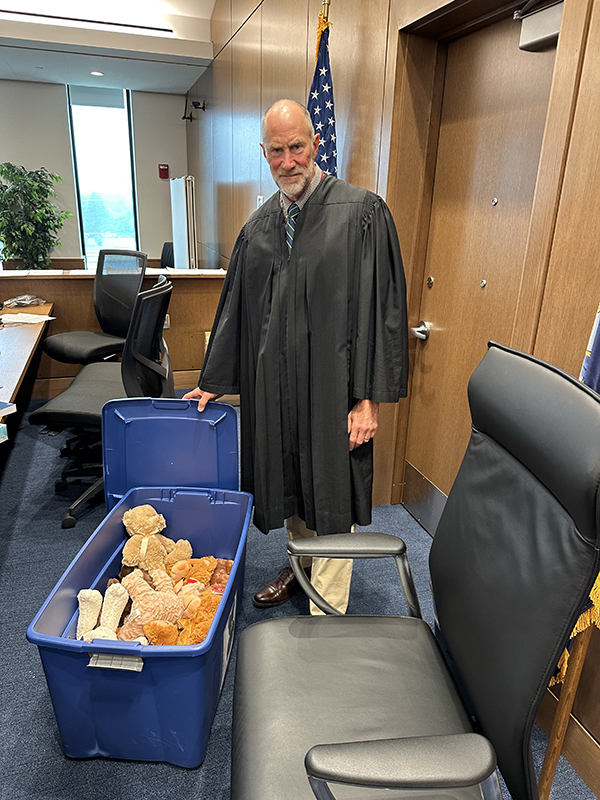The Honorable Michael A. Duddy’s courtroom looks markedly different from most in the U.S. Judge Duddy works in the protective custody docket, which encompasses cases of child abuse and neglect in his region: York County, Maine. A year ago, when a new courthouse was constructed, he saw an opportunity to deepen his work keeping children safe by creating a more welcoming space for them. “All of the parties – the parents, the kids, and others who are affiliated with the docket – have significant trauma in their life,” said Judge Duddy. “As I try to preside over the cases with therapeutic jurisprudence, I’m constantly mindful about how the parties’ trauma histories impact their presentation in court, their ability to be in court, and so on.”
With that in mind, when choosing his space in the new courthouse, he selected a courtroom with windows, overlooking nature and letting in natural light. He replaced the portraits of past judges that traditionally decorate courtroom walls with seascapes and landscapes. He also rearranged the seating in the courtroom into a semi-circle instead of the traditional rows of benches, which felt hierarchical and prevented eye contact. And he added an artificial fir tree indoors.

“I’m not sure you can make any courtroom soothing,” said Judge Duddy. “That would be a step too far. But as silly as it may sound, that little tree in the corner of the courtroom has helped. Especially when kids come into the courtroom, not necessarily during a contested proceeding but if they want to meet and talk with the judge, being able to walk around and look at the landscapes and hang ornaments from the tree, it helps them have a different perception of the courtroom. Even if you can’t see actual nature, there’s a lot of research about how nature photos or paintings help contribute to healing.”
In a conference room behind the courtroom, he has outfitted the walls with artwork designed to relieve tension among parties who are often frustrated or angry. “I’ve got plants in there, some kids’ books in there, so that when counsel comes in, they’re greeted with an environment that’s intended to say, ‘Take a breath. Relax for a bit. Let’s try to talk things through.’ I’ve heard from counsel on a number of occasions that the remote chambers experience achieves what I hope it does, which is an opportunity to just pause and shed some of the stress that you carry into the chambers.”
The final touch: Judge Duddy keeps a large plastic bin full of teddy bears in his courtroom, which he hands out not only to every child who passes through, but sometimes also to the lawyers and guardians who accompany them. Julianna Morningstar is a former participant in one of Judge Duddy’s adoption cases who presented a keynote speech at the Maine Youth Leadership Advisory Team’s 2022 Teen Conference. In her speech, she recalled being adopted with all six of her younger siblings after years of tumult in the foster care system. She was 17 years old when she received a teddy bear from the bin at the conclusion of her case.
“I remember looking really closely at the keychain on the bear, and it said the word ‘chosen’ on it,” said Julianna. “As soon as I saw that word on the keychain, I remember feeling this huge relief that this battle that I had been struggling with – feeling like a burden and feeling like I was in the way – was finally over. I didn’t even know that I wanted to be chosen, but man, that felt good.”
Judge Duddy recently became involved in the APA Foundation’s Judges and Psychiatrists Leadership Initiative (JPLI) by attending a Train the Trainer JPLI session in Tampa, FL at the request of his chief judge. His expertise is supporting the JPLI, which APAF created to address the overrepresentation of individuals with serious mental illness (SMI) in the justice system.
To date, the APA Foundation has trained pairs of judges and psychiatrists in the JPLI curriculum in over 40 U.S. states. To learn more or become part of the JPLI, visit apaf.org/justice.
